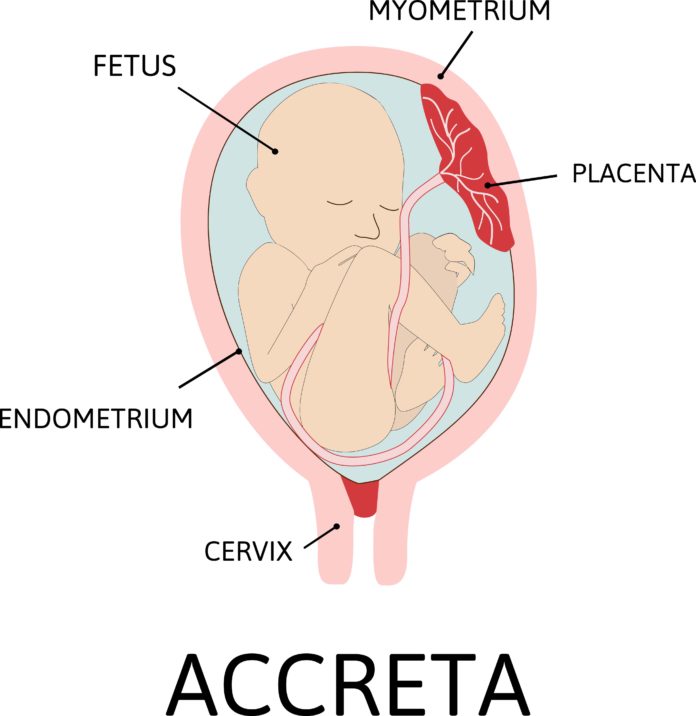Placenta accreta is a severe condition in pregnancy. It occurs when the placenta starts growing too deeply into the wall of the uterus. What usually happens is that the placenta detaches from the uterine wall after the baby’s delivery. However, a part or all of the placenta stays attached to the wall in placenta accrete. It can result in severe blood loss after delivery. Placenta accreta is a high-risk pregnancy complication.
Introduction
Placenta accreta causes the placenta to grow too deeply into the uterine wall. The placenta is the food source for the baby in the uterus. If the condition is severe, it can result in excessive bleeding, which can be life-threatening. If the condition is diagnosed when a woman is pregnant, a c-section delivery followed by a hysterectomy – surgical removal of your uterus – may be needed.
.
What are the Symptoms of Placenta Accreta?
The signs and symptoms of placenta accreta are usually not noticeable during pregnancy. Most often, doctors detect it when they perform a routine ultrasound. However, in some cases, it causes vaginal bleeding when a woman is in her third trimester, i.e., weeks 27 to 40.
Thus, it is essential to see a doctor if a pregnant woman experiences vaginal bleeding during her third trimester. Apart from that, if a pregnant woman experiences heavy or severe bleeding accompanied by abdominal pain, she must seek emergency care.
What are the Causes of Placenta Accreta?
The causes of placenta accreta are not known . It may be the result of scarring following a cesarean section or uterine surgery.
Basically, the scars enable the placenta to grow deeply into the wall of the uterus. Pregnant women who have placenta previa (placenta lies very low in the uterus covering all or part of the cervix) are at a higher risk of this condition.
However, in some cases, it occurs in women who do not have a history of placenta previa or uterine surgery. Similarly, a cesarean delivery also enhances the risk factors during future pregnancies. In other words, the higher the number of cesarean deliveries, the greater the risks.
When to See a Doctor
Often, women with placenta accreta do not generally display any signs or symptoms when pregnant. This condition is usually detected during a routine ultrasound. Hence, make sure to monitor your health during pregnancy.
.
Call 1860-500-1066 to book an appointment.
Complications
Placenta accreta can cause:
- Heavy vaginal bleeding: Placenta accreta poses a bigger risk of severe vaginal bleeding (haemorrhage) post-delivery. The bleeding may cause a severe condition that prevents the blood from clotting normally.
- Premature birth: Placenta accreta may cause labor to begin early
How Can You Prevent Placenta Accreta?
You cannot prevent placenta accreta. The risk factors of placenta accreta increase if a woman has had multiple cesarean sections in the past. Similarly, the condition of placenta previa (placenta lies very low in the uterus covering all or part of the cervix) also increases the risk. Women with such medical conditions must consult their doctors about the risks to receive proper treatment.
What are the Treatment Options for Placenta Accreta?
If diagnosed, your doctor will most likely make a plan to ensure the safest delivery possible. Severe cases require surgery for treatment.
Firstly, your doctor will perform cesarean delivery for childbirth. After that, your doctor may perform a hysterectomy. It is done to prevent serious blood loss that can happen if all or part of the placenta remains attached to the uterus after childbirth.
Women who wish to get pregnant again have the option to undergo a surgical procedure after delivery that can preserve their fertility. It leaves much of the placenta in the uterus. However, it carries high risks and complications.
A hysterectomy can be recommended to you if you continue experiencing vaginal bleeding after the procedure. This procedure makes it difficult to get pregnant again. Thus, discuss all the treatment options with your doctor thoroughly.
Conclusion
All in all, if you get an early diagnosis and proper treatment for placenta accreta, you will not have lasting complications and can make a full recovery. Since women cannot conceive after a hysterectomy, make sure to discuss all future pregnancies with your doctor before deciding on your treatment plan.
Frequently Asked Questions (FAQs)
How is placenta accreta diagnosed?
An ultrasound usually helps diagnose placenta accreta. However, if the ultrasound image cannot diagnose it, an MRI can be helpful.
What to do if I suspect I have placenta accreta?
Consult with an obstetrician experienced in the diagnosis and treatment of placenta accreta.
How many women get placenta accreta?
It was rare earlier, but it is becoming more prevalent now. At least 1 out of 272 pregnancies is affected by this condition. It is mostly due to an increase in cesarean deliveries over the last few decades.


















